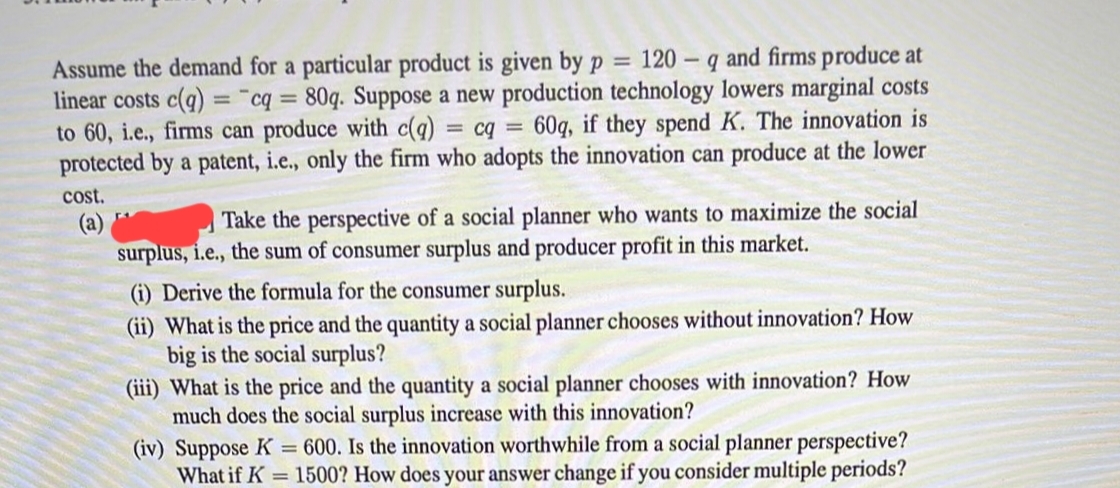Assume the demand for a particular product is given by p = 120 - q and firms produce at linear costs c(q) = cq = 80q. Suppose a new production technology lowers marginal costs to 60, i.e., firms can produce with c(q) = cq = 60q, if they spend K. The innovation is protected by a patent, i.e., only the firm who adopts the innovation can produce at the lower cost. Take the perspective of a social planner who wants to maximize the social surplus, i.e., the sum of consumer surplus and producer profit in this market. (i) Derive the formula for the consumer surplus. (ii) What is the price and the quantity a social planner chooses without innovation? How big is the social surplus? (iii) What is the price and the quantity a social planner chooses with innovation? How much does the social surplus increase with this innovation? (iv) Suppose K = 600. Is the innovation worthwhile from a social planner perspective? What if K = 1500? How does your answer change if you consider multiple periods?
Assume the demand for a particular product is given by p = 120 - q and firms produce at linear costs c(q) = cq = 80q. Suppose a new production technology lowers marginal costs to 60, i.e., firms can produce with c(q) = cq = 60q, if they spend K. The innovation is protected by a patent, i.e., only the firm who adopts the innovation can produce at the lower cost. Take the perspective of a social planner who wants to maximize the social surplus, i.e., the sum of consumer surplus and producer profit in this market. (i) Derive the formula for the consumer surplus. (ii) What is the price and the quantity a social planner chooses without innovation? How big is the social surplus? (iii) What is the price and the quantity a social planner chooses with innovation? How much does the social surplus increase with this innovation? (iv) Suppose K = 600. Is the innovation worthwhile from a social planner perspective? What if K = 1500? How does your answer change if you consider multiple periods?
Chapter1: Making Economics Decisions
Section: Chapter Questions
Problem 1QTC
Related questions
Question

Transcribed Image Text:Assume the demand for a particular product is given by p = 120 q and firms produce at
linear costs c(q) = cq = 80q. Suppose a new production technology lowers marginal costs
to 60, i.e., firms can produce with c(q) = cq = 60q, if they spend K. The innovation is
protected by a patent, i.e., only the firm who adopts the innovation can produce at the lower
cost.
(a)
Take the perspective of a social planner who wants to maximize the social
surplus, i.e., the sum of consumer surplus and producer profit in this market.
(i) Derive the formula for the consumer surplus.
(ii) What is the price and the quantity a social planner chooses without innovation? How
big is the social surplus?
(iii) What is the price and the quantity a social planner chooses with innovation? How
much does the social surplus increase with this innovation?
(iv) Suppose K = 600. Is the innovation worthwhile from a social planner perspective?
What if K = 1500? How does your answer change if you consider multiple periods?
Expert Solution
This question has been solved!
Explore an expertly crafted, step-by-step solution for a thorough understanding of key concepts.
Step by step
Solved in 4 steps with 6 images

Knowledge Booster
Learn more about
Need a deep-dive on the concept behind this application? Look no further. Learn more about this topic, economics and related others by exploring similar questions and additional content below.Recommended textbooks for you


Principles of Economics (12th Edition)
Economics
ISBN:
9780134078779
Author:
Karl E. Case, Ray C. Fair, Sharon E. Oster
Publisher:
PEARSON

Engineering Economy (17th Edition)
Economics
ISBN:
9780134870069
Author:
William G. Sullivan, Elin M. Wicks, C. Patrick Koelling
Publisher:
PEARSON


Principles of Economics (12th Edition)
Economics
ISBN:
9780134078779
Author:
Karl E. Case, Ray C. Fair, Sharon E. Oster
Publisher:
PEARSON

Engineering Economy (17th Edition)
Economics
ISBN:
9780134870069
Author:
William G. Sullivan, Elin M. Wicks, C. Patrick Koelling
Publisher:
PEARSON

Principles of Economics (MindTap Course List)
Economics
ISBN:
9781305585126
Author:
N. Gregory Mankiw
Publisher:
Cengage Learning

Managerial Economics: A Problem Solving Approach
Economics
ISBN:
9781337106665
Author:
Luke M. Froeb, Brian T. McCann, Michael R. Ward, Mike Shor
Publisher:
Cengage Learning

Managerial Economics & Business Strategy (Mcgraw-…
Economics
ISBN:
9781259290619
Author:
Michael Baye, Jeff Prince
Publisher:
McGraw-Hill Education